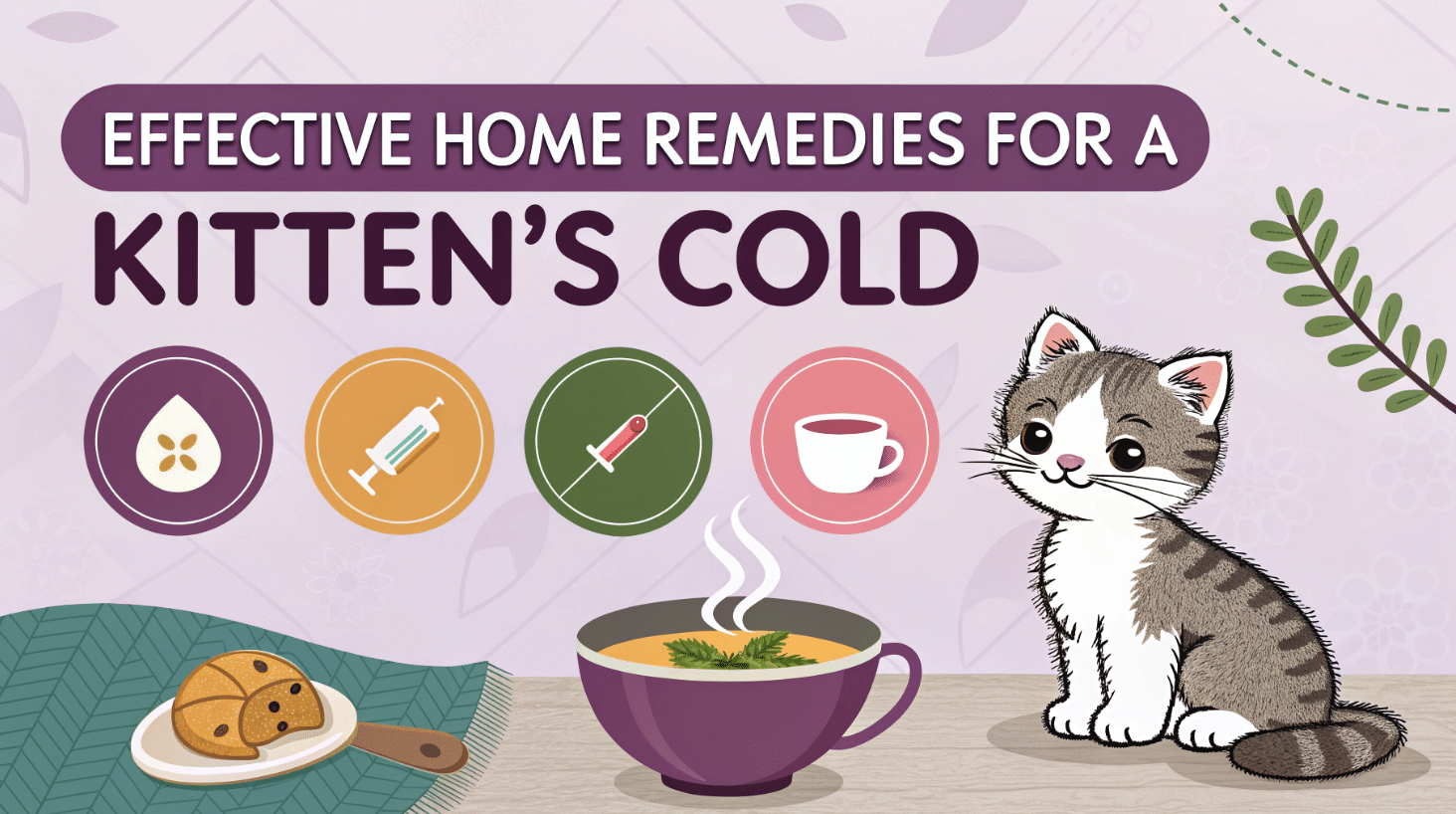
When your kitten sneezes or has watery eyes, you might wonder how cats get a cold. These symptoms often indicate a minor respiratory infection. Recognizing these early signs is crucial for adequate care. If you’re wondering how to treat a kitten with a cold, simple home remedies can help. Keeping your kitten warm and making sure it stays hydrated are key.
A steamy bathroom can help open nasal passages and provide relief. Your attentive care is crucial for their recovery. If symptoms last more than a few days, see a veterinarian to avoid complications like pneumonia.
How Do You Treat a Kitten with a Cold?
When your kitten shows signs of a cold, you might feel concerned about their well-being. Understanding how to treat a cat with a cold can make a significant difference in their recovery.
Let’s check out some immediate home remedies and detailed steps to help your furry friend feel better.
Immediate Home Remedies
Keeping Your Kitten Warm
A warm environment is crucial for a kitten battling a cold. You should ensure that their sleeping area is cozy and free from drafts. Use a soft blanket or a heated pad set on low to provide extra warmth.
This comfort helps their immune system fight off the infection more effectively.
Ensuring Proper Hydration
Hydration plays a vital role in recovery. Encourage your kitten to drink water regularly. If they seem reluctant, try offering them a broth made from low-sodium chicken or beef. This not only keeps them hydrated but also provides essential nutrients.
Remember, a well-hydrated kitten recovers faster from cat colds.
Step by Step Detailed Instructions
Administering Steam Therapy
Steam therapy can alleviate congestion in kittens. To create a steamy environment, run a hot shower and let your kitten sit in the bathroom for about 10-15 minutes. The steam helps loosen mucus and clear nasal passages, making it easier for them to breathe. Repeat this process twice daily for optimal results.
Cleaning Nasal Passages
Keeping your kitten’s nasal passages clean is essential. Use a soft cloth dampened with saline solution to gently wipe away any discharge from their nose and eyes. This not only provides relief but also prevents further irritation.
Regular cleaning ensures that your kitten remains comfortable as they recover from cat colds.
Follow these steps to treat a cat with a cold at home. If symptoms persist or worsen, see a veterinarian for evaluation and medication. Early care ensures a quick recovery.
Recognizing Symptoms of a Kitten’s Cold
When your kitten starts to show signs of illness, it can be a worrying time. Understanding the symptoms of a kitten’s cold is crucial for providing the right care. Early detection can make a significant difference in their recovery process.
Common Symptoms
Kittens, like humans, can catch colds. These colds are often caused by upper respiratory infections. Recognizing the common symptoms early can help you take swift action.
Sneezing and Nasal Discharge
One of the first signs you might notice is sneezing. A runny nose often accompanies this. The discharge can vary in color and consistency. Clear discharge is typical, but if it turns yellow or green, it might indicate a more serious infection.
Keeping an eye on these changes is important.
Watery Eyes
Watery eyes are another common symptom. You might see your kitten frequently pawing at their eyes or notice tear stains on their fur. This can be uncomfortable for them, so gently wiping their eyes with a damp cloth can provide some relief.
When Symptoms Worsen
Sometimes, what starts as mild cold symptoms in a cat can escalate. Knowing when to seek further help is vital.
Persistent Coughing
If your kitten develops a persistent cough, it could be a sign that the infection is worsening. Coughing can indicate that the cold has moved deeper into the respiratory system. Monitoring the frequency and severity of the cough is essential.
Difficulty Breathing
Difficulty breathing is a serious symptom. If your kitten is struggling to breathe or you notice their sides caving in with each breath, it’s time to consult a veterinarian immediately. This could indicate a severe respiratory issue that requires professional intervention.
Understanding these symptoms and their implications can help you provide the best care for your kitten. Always remember, if you’re unsure or if symptoms persist, seeking veterinary advice is the best course of action.
Caring for Your Cat at Home
When your kitten catches a cold, you might feel a mix of concern and urgency to help them recover. Caring for your cat at home involves creating a nurturing environment that supports their healing process.
With the right supplies and understanding of your kitten’s needs, you can make a significant difference in their recovery journey.
What You Need
To effectively care for your kitten at home, gather some essential supplies. These items will help you provide comfort and support during their recovery.
Essential Supplies
-
Soft Blankets: Keep your kitten warm by placing soft blankets in their favorite resting spots. Warmth is crucial for their comfort and recovery.
-
Humidifier or Vaporizer: Increase the humidity in your home to ease your kitten’s breathing. This helps alleviate congestion and keeps their nasal passages moist.
-
Saline Solution: Use a saline solution to gently clean your kitten’s runny nose and eyes. This prevents irritation and provides relief.
-
Low-Sodium Broth: Encourage hydration by offering low-sodium chicken or beef broth. This not only keeps them hydrated but also provides essential nutrients.
Optional Items
-
Heated Pad: A heated pad set on low can provide additional warmth, especially during colder months.
-
Nutritional Supplements: Consult your veterinarian about supplements that might boost your kitten’s immune system.
-
Interactive Toys: Keep your kitten engaged with toys that stimulate their mind and encourage gentle play.
Who Should Try This?
Understanding when to care for your kitten at home and when to seek professional help is crucial. Here’s a guide to help you decide.
Suitable for Mild Cases
Home care is suitable for kittens showing mild symptoms like sneezing, watery eyes, and slight nasal discharge. If your kitten remains active and continues eating and drinking, home remedies can be effective.
Not Recommended For
Avoid home care if your kitten shows severe symptoms such as persistent coughing, difficulty breathing, or lethargy. Kittens with underlying health conditions or those who are very young or old should see a veterinarian immediately.
Professional evaluation ensures they receive the necessary treatment and medication.
Caring for your cat at home requires attentiveness and the right resources. By providing a warm, humid environment and ensuring proper hydration, you can help your kitten recover from a cold.
Always monitor their symptoms closely and consult a veterinarian if you notice any signs of worsening.
Potential Challenges in Treating a Cat with a Cold
Caring for a kitten with a cold can be a rewarding yet challenging experience. You might face several obstacles while ensuring your furry friend receives the best care possible. Understanding these challenges can help you navigate them more effectively.
Difficulty in Administering Care
Administering care to a kitten with a cold requires patience and persistence. You may encounter some difficulties, especially if your kitten is restless or uncooperative.
Handling a Restless Kitten
Kittens are naturally curious and energetic, even when they are not feeling their best. A restless kitten can make it difficult for you to administer treatments like steam therapy or nasal cleaning. To handle this, try to create a calm environment. Use gentle, soothing tones when speaking to your kitten.
You might also consider using a soft towel to gently wrap your kitten, providing a sense of security while you administer care.
Ensuring Consistent Treatment
Consistency is key in treating a kitten’s cold. You need to follow a regular schedule for administering remedies and monitoring symptoms. However, life can get busy, and maintaining this consistency might be challenging.
To overcome this, set reminders on your phone or create a treatment schedule that you can easily follow. This ensures that your kitten receives the necessary care without interruptions.
Monitoring Progress
Monitoring your kitten’s progress is crucial in determining the effectiveness of the treatment. You need to be observant and attentive to notice any changes in their condition.
Identifying Improvement
Signs of improvement can include a decrease in sneezing, clearer nasal passages, and a return to normal energy levels. You might also notice your kitten eating and drinking more regularly. Keep a daily log of these observations to track their progress. This will help you determine if the home remedies are working or if further action is needed.
Recognizing Lack of Progress
If your kitten’s symptoms persist or worsen, it might indicate a lack of progress. Look for signs such as persistent coughing, difficulty breathing, or lethargy. These symptoms suggest that the cold might be more severe than initially thought.
In such cases, consulting a veterinarian becomes essential. They can provide a more targeted treatment plan to address your kitten’s needs.
Understanding these potential challenges and how to address them can make a significant difference in your kitten’s recovery journey. With patience, consistency, and careful monitoring, you can help your kitten overcome their cold and return to their playful self.
Common Mistakes to Avoid
When caring for a kitten with a cold, you might unknowingly make some common mistakes. These errors can hinder your kitten’s recovery and even worsen their condition. Understanding these pitfalls helps you provide the best care possible.
Overlooking Symptoms
Ignoring certain symptoms can lead to complications. You need to pay close attention to your kitten’s behavior and health.
Ignoring Persistent Cough
A persistent cough in your kitten should never be ignored. This symptom might indicate that the cold has progressed into a more serious respiratory issue. If your kitten continues to cough despite home remedies, it’s crucial to seek veterinary advice. Early intervention can prevent long-term health problems.
Dismissing Lethargy
Lethargy is another symptom that requires your attention. If your kitten seems unusually tired or inactive, it might be a sign of a worsening condition. Monitor their energy levels closely.
If lethargy persists, consult a veterinarian to rule out any underlying health issues.
Incorrect Use of Remedies
Using remedies incorrectly can do more harm than good. It’s important to follow guidelines carefully when treating your kitten at home.
Overheating the Kitten
Keeping your kitten warm is essential, but overheating can be dangerous. Avoid using heating pads on high settings or placing your kitten too close to heat sources. Instead, create a cozy environment with soft blankets and a low-setting heated pad. This ensures your kitten stays comfortable without the risk of overheating.
Using Inappropriate Products
Choosing the right products for your kitten’s care is vital. Avoid using human medications or products not specifically designed for cats. For instance, adding substances like Vicks to a humidifier can be harmful. Stick to safe options like saline solutions for cleaning nasal passages and consult your vet for any additional treatments.
By avoiding these common mistakes, you can ensure a smoother recovery for your kitten. Always stay vigilant and consult a veterinarian if you’re unsure about any aspect of your kitten’s care.
Caring for a kitten with a cold requires your attention and dedication. Early detection and home care play a crucial role in ensuring a swift recovery. Recognizing symptoms early allows you to provide immediate comfort and support. However, if symptoms persist or worsen, seeking veterinary care becomes essential. A veterinarian can offer targeted treatments that home remedies might not address.
To keep your kitten healthy in the future, focus on preventive strategies. Regular check-ups and a balanced diet boost their immune system, reducing the risk of future illnesses. Your proactive approach ensures your kitten’s well-being.

In her previous life, Lisa traveled extensively, both for work and leisure. After the pandemic struck, Lisa locked up her luggage and adopted a cat ever since.
Lisa is now an avid cat lover, she devotes most of her free time serving as butler to her adorable feline at home. When she is not with her cat, she can be seen using her phone sourcing for the latest cat supplies online.


